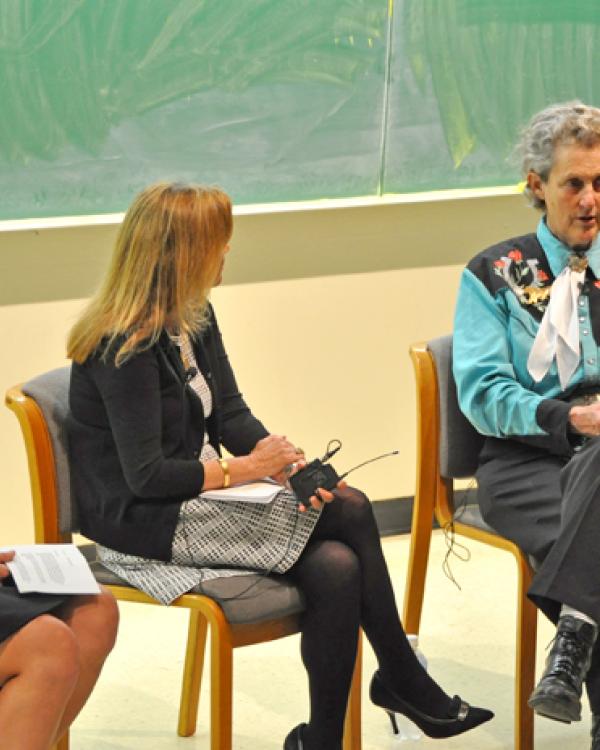
Amber Moran, Lynn Koegel, and Temple Grandin
On Tuesday, May 10, students and faculty from UC Santa Barbara’s Gevirtz School participated in a special hour question & answer session with Dr. Temple Grandin, perhaps the world’s most accomplished adult with autism. Grandin, who has been hailed as one of the “100 Most Influential People in the World” by Time magazine, first answered questions asked by Dr. Lynn Koegel, Clinic Director of the Koegel Autism Center at UCSB, and Dr. Amber Moran of the Teacher Education Program, and then took questions from the crowd of students and faculty.
The event was made possible through UCSB Arts & Lectures, who presented a public lecture by Grandin later that evening.
Throughout the presentation, Grandin made a case for strength-based teaching and counseling, stressing how important it was to find what people could do and then encouraging those affinities. She argued that people on the autism spectrum need to be stretched, just not “dumped in the deep end.” At the same time she insisted that children need not be coddled, suggesting too many were left in their basements playing computer games and not encouraged to make strides in the outside world to build some social skills. She also drove home the importance of finding shared interests for people on the spectrum as a way to both help them connect with others and as a starting point for teaching.
Temple Grandin is currently a professor of animal science at Colorado State University; in addition to her advocacy for those with autism she is a consultant to the livestock industry on animal behavior. Despite not talking until she was three-and-a-half and claiming she’s primarily a visual thinker and that words are her second language, Grandin has authored numerous, best-selling books including Animals in Translation: Using the Mysteries of Autism to Decode Animal Behavior and Thinking in Pictures: Other Reports from My Life with Autism.
The Koegel Autism Research and Training Center, overseen by Drs. Robert and Lynn Koegel, is dedicated to improving the lives and prognoses of children with autism, as well as the lives of their families. It has been recognized by the National Academy of Sciences – and ranked among the country’s top 12 such facilities – for its innovative research and teaching methods in a variety of areas, including parent education, language development, and teacher education. It offers a state-of-the-art behavioral approach to autistic children. The Koegel Autism Center is part of The Gevirtz School at UC Santa Barbara.